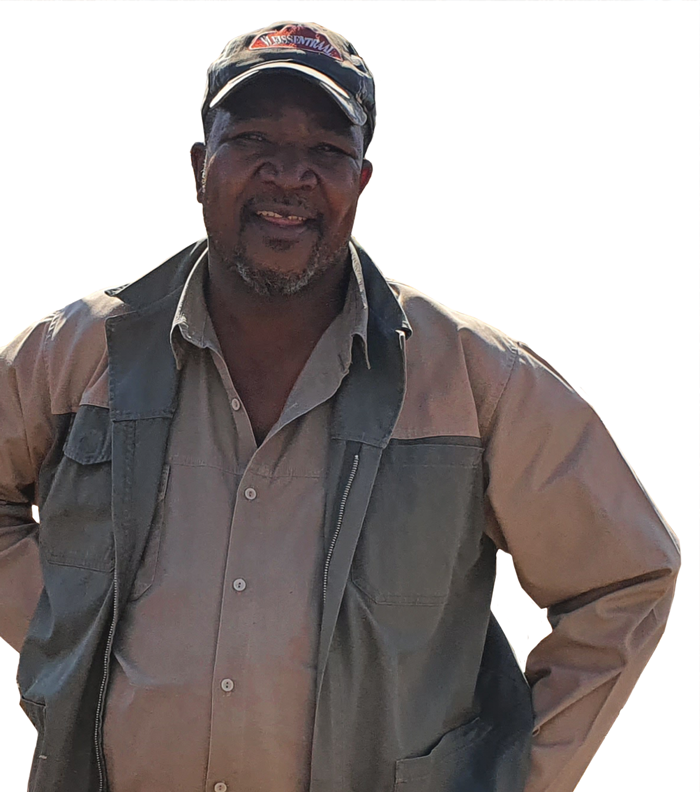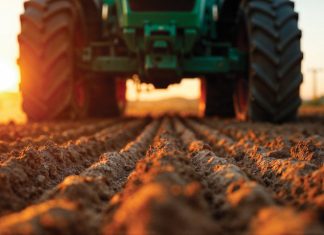 With a yield of 14,7 t/ha, Bheki Mabuza (48) walked away with a third-place finish in the category for maize production in the eastern Highveld region in the 2021 Grain SA Grow for Gold National Yield Competition. The maize was planted between 10 and 28 October 2020 at a planting density of 55 000 plants/ha.
With a yield of 14,7 t/ha, Bheki Mabuza (48) walked away with a third-place finish in the category for maize production in the eastern Highveld region in the 2021 Grain SA Grow for Gold National Yield Competition. The maize was planted between 10 and 28 October 2020 at a planting density of 55 000 plants/ha.
What makes this achievement even more remarkable is that Bheki, who farms on Donkerkop near Amersfoort in Mpumalanga, competed amongst the elite of South Africa’s commercial maize producers.
From thriving taxi owner to successful farmer
Before making the farm his home, Bheki was a flourishing taxi owner. ‘Being a successful taxi owner is one of the most dangerous jobs in South Africa, as your life is in danger because of other people’s jealousy,’ says Bheki, who became part of the crime statistics when he was shot because of his success. After he recovered, he exchanged city life for the farm and taxis for cattle.
Bheki is primarily a cattle farmer and owns 500 cows and 22 Brangus bulls. When he joined Grain SA eight years ago, he started attending study group sessions and became so inspired that he decided to try his hand at planting maize. He started small and planted only 3 ha, then increased it to 12 ha and later to 30 ha when the harvest was successful. Through hard work (and asking many questions), he is now planting 110 ha of maize on land owned by him and his brother. He also rents 40 ha of land from a neighbouring farmer, where he plants soybeans.
He would like to thank Grain SA who ‘opened a new world’ to him through the study groups and training. In 2019 Bheki was one of the runners-up in the Grain SA Smallholder Farmer of the Year competition. Through Grain SA his path crossed with that of Francois Scheepers, also known as Soois or Skippies, who became his mentor. ‘Skippies explained everything to me. He taught me everything I know, even how to calibrate planters and set sprayers. Now I can help myself. He has put the light on and showed me where I had to walk,’ says Bheki about his mentor, for whom he has great respect and admiration. Soois was also the first person he phoned after receiving his Grow for Gold certificate.
 Asking, learning and improving
Asking, learning and improving
Bheki has successfully completed four Grain SA training courses for which he received certificates. ‘Although the study groups and training have played a huge role in the knowledge he has accumulated in the past eight years, it is his hunger for information that has played the biggest part in his success,’ says Jurie Mentz, development coordinator at Grain SA’s Louwsburg regional office. Bheki has also focussed on getting his soils balanced and is following excellent liming and fertilisation practices. Regular soil sampling is done, and problems are identified and rectified timeously. All these practices contribute to his average yield of 10,68 t/ha on the 110 ha of maize planted.
Bheki has not just learned about the soil and the crops that grow on the farm, but has also made sure he knows his ‘enemy’. He asked Skippies about any weeds growing in the field. ‘This way I learned what the weed is and how to control it.’
Other practices that he feels strongly about, include the following:
- Timing is important, so know your planting window.
- Know your soil. If you do soil sampling, analysis and corrections early in the season, it will make an enormous difference in the yields at the end of the season.
- Do not underestimate the importance of adding lime to your soil.
- Do an annual post-season business analysis. This way you can see what you did right and where things went off track.
A passionate and frugal farmer
This father of eight dreams of owning a crop farm where he can plant at least 400 ha of maize. ‘I have enough land for my cattle, but I need more land to plant,’ he says. Providing food for the people of South Africa excites Bheki. ‘I am passionate about the process of planting, watching the crops grow, harvesting and doing it again next year. Although it is nice to make money, I know that my maize is helping to eliminate hunger in South Africa.’
He encourages other farmers to always be ready for the future. ‘When you have finished planting, first pay off all your debts, buy your inputs – seeds, chemicals and fertiliser – for the next season and keep it in storage. You cannot wait until it rains before you buy inputs.’
Bheki also feels strongly about spending money carefully. ‘Do not think if you make a lot of money, it will be available for years to come. There may be a drought, so don’t spend money on things that will not bring in money,’ he advises.
Two of Bheki’s eight children want to follow in their father’s footsteps. ‘After school they help with the cattle and they love driving the tractors.’ Bheki hopes that they will develop enquiring minds and become successful commercial farmers.



















